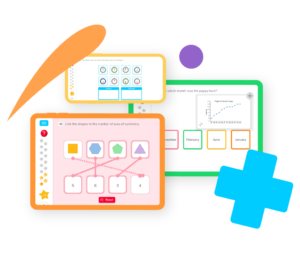Home → Maths → Maths skills
Learning maths doesn’t have to be a battle. At DoodleLearning, we’ve taken the guesswork out of understanding KS1 and KS2 maths curriculum concepts so you can help your child build confidence and master specific maths skills. Select a maths topic below to explore our in-depth guides complete with practice problems to try at home!

There are a few things that set DoodleLearning apart from other maths skills sites. For one, all of our maths guides are written or reviewed by real primary maths teachers and tutors. Fuelled by their classroom experience, our teaching experts write our maths guides in a way that’s easy for parents to follow along.
At the end of each maths skill page, you’ll find practice problems complete with an answer guide to help explain how we got to the answer. From mastering fractions to learning your times tables, browse our primary math concepts by topic.
The study of mathematics forms the foundation of a child’s education and plays a crucial role in developing critical thinking and problem-solving skills. Primary school maths, covering Key Stage 1 (KS1) and Key Stage 2 (KS2), introduces children to essential maths concepts that will be built upon in later years.
It’s important parents understand which maths topics are taught in primary school so they are better equipped to help their children succeed in their mathematical journey. Let’s take a closer look!
Understanding numbers and their place values is fundamental. In KS1 maths, children learn to count, read, and write numbers up to 100, recognise odd and even numbers, and understand place value for tens and units. By KS2, this extends to larger numbers, including thousands and decimals, and understanding place value up to at least 1,000,000. This is one of the foundational maths topics that support more advanced learning.
Addition and subtraction are core arithmetic skills. Early on, students learn to add and subtract numbers within 20, progressing to higher numbers as they advance. They also start solving simple word problems that require finding the sum or difference. In later years, students are expected to handle more complex problems involving larger numbers, subtraction with regrouping, and multi-step problems.
Children are introduced to simple multiplication and division earlier than you might think. The concepts of multiplication and division are first introduced through repeated addition and repeated subtraction. Once kids start learning their times tables, they typically start with 2, 5, and 10. By KS2, they should know all times tables up to 12 and be able to perform more complex calculations, including long multiplication and long division. Understanding these operations is crucial for future maths topics.
Select a year group
Fractions start in KS1 with simple concepts like halves and quarters. In KS2, this extends to understanding equivalent fractions, adding and subtracting fractions with the same denominator, and finding fractions of numbers and quantities. Mastery of fractions is essential for success in secondary school maths topics.
Measurement involves understanding and using units of measure for length, mass, volume, and time. KS1 focuses on comparing and ordering lengths, mass, and volumes, while KS2 covers more advanced concepts such as converting between different units of measure.
KS1 introduces children to simple data handling, such as creating and interpreting basic graphs and charts. In KS2, students work with more complex data sets, learn to interpret and construct bar charts, pictograms, and line graphs, and understand concepts of averages. These skills are important for making sense of information and drawing conclusions.
Throughout KS1 and KS2, children are encouraged to develop their reasoning skills. This involves explaining their thought processes, making connections between different areas of maths, and solving problems in a logical and systematic way. Reasoning is a key skill for all maths topics and beyond.
Mastering essential maths skills in primary school sets the stage for future academic success and practical life skills. By understanding and supporting the key areas of number and place value, arithmetic, fractions, measurement, geometry, statistics, and mathematical reasoning, parents and educators can help children build a strong mathematical foundation. Encouraging regular practice, making maths fun, and using real-world examples can make a significant difference in a child’s confidence and ability in maths. Embrace the journey of learning math topics, and you’ll be laying the groundwork for your child’s bright future.

Parents, sign up for a DoodleMaths subscription and see your child become a maths wizard!

Book a chat with our team
If you’d like to use Doodle’s browser version, please visit this page on a desktop.
To log in to Doodle on this device, you can do so through our apps. You can find out how to download them here: